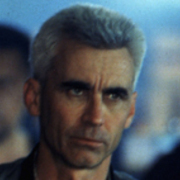
Lee Tamahori
Lee Tamahori won acclaim with his first feature film in 1994, an adaptation of the Alan Duff novel Once Were Warriors. Tamahori had worked in the New Zealand film industry for more than a decade before Warriors made his name. Since then he has directed movies largely beyond New Zealand shores — including James Bond blockbuster Die Another Day, and thriller The Edge.
Tamahori was born in Wellington in 1950, the self-styled ‘hybrid' child of a European mother and Māori father. He began his career as a commercial artist and photographer. Tamahori joined the film industry in the late 1970s, initially getting in the door by working for nothing. He scored jobs as a boom operator for Television New Zealand, and on 1978 feature Skin Deep.
Tamahori went on to work as a boom operator on Kiwi classics Goodbye Pork Pie and Bad Blood, before Geoff Murphy told him he was the best person to be first assistant director on Utu. The promotion made for an exciting year, with Merry Christmas Mr Lawrence following soon after. Tamahori got further credits as first assistant director on Murphy's The Quiet Earth, The Silent One, and Came a Hot Friday.
Having no luck getting directing jobs, in 1986 Tamahori co-founded long-running commercial production company Flying Fish. He went on to direct more than 100 commercials, including a number of award-winners. His work includes memorable advertisements for Fernleaf butter, the bungy-jumping fisherman for Instant Kiwi and a star-studded Commonwealth Games commercial, set during World War One.
Working with the late John Day, he directed this 1988 documentary about a visit to Ruatoria by band Herbs. Tamahori's first venture into drama came in 1989, when he directed 'Thunderbox', an episode from Māori-driven drama series E Tipu E Rea. 'Thunderbox' is a comic-tinged tale of a father and son trying to get along in the Pākehā world. Tamahori followed it with episodes of anthology series The Ray Bradbury Theatre.
His big break as a director came with Once Were Warriors (1994). The film went on to outgross Jurassic Park on its New Zealand release, and won audiences, acclaim and awards around the world. Shot in a style that mixes gritty realism with bold use of colour, Once Were Warriors examined a world of domestic violence and gangs for an urban Māori family. The movie's unflinching depictions of the former matched Tamahori's desire for films that evoke a response: films that "make you reel out of the theatre and you have to go to a bar and have a drink."
The film's journey to the screen was a long one, and few expected the downbeat story to travel like it did. Publications in New Zealand (NZ Herald, More), Australia (The Melbourne Age, Sydney Sunday Telegraph) and the US (Time) judged Warriors one of the ten best films of the year. American critics fell over themselves praising the performances of central couple Temuera Morrison (who was compared more than once to Marlon Brando) and Rena Owen. American Roger Ebert praised Tamahori for the film's sweeping narrative momentum, and "creating a convincing sense of daily life in the household and the neighbourhood". Wrote Film Threat reviewer Paul Zimmerman: "as a first film for Lee Tamahori, Warriors is the most sure-handed stylistic debut of the year".
The film now ranks as the fourth highest grossing New Zealand title at the local box office (The World's Fastest Indian, Boy and Hunt for the Wilderpeople later overtook first position, though inflation-adjusted figures still put Warriors in pole position).
This longtime fan of American film then left Aotearoa to work in Hollywood. Tamahori's debut feature in America was 50s era crime thriller Mulholland Falls (1996). Tamahori worked alongside Nick Nolte, John Malkovich and legendary cinematographer Haskell Wexler. Tamahori later argued that the film was damaged after he bowed to studio pressure to shorten it.
Since then, Tamahori's work has included David Mamet-scripted backwoods adventure The Edge (1997), starring Anthony Hopkins and a memorably angry bear, Next (2007), with Nicolas Cage, an episode of acclaimed drama The Sopranos, and Die Another Day (2002), the second most successful James Bond entry released till that date. The movie, whose attractions include melting ice-lairs, hovercraft battles and Halle Berry, marked the 40th anniversary of the Bond franchise.
In 2011 Tamahori directed The Devil's Double, a Sundance-selected adaptation of Latif Yahia's account of his time as a double for the son of Saddam Hussein. Tamahori went on to reunite with many of the Devil's Double team for revenge tale Emperor, which is now in post-production. Set in 16th century Italy, the film involves a revenge plot against emperor Charles V (Adrien Brody).
Tamahori also sought crowdfunding to help get a New Zealand project off the ground. Based on the novel Bulibasha by Witi Ihimaera, Mahana is about two families battling for supremacy in the shearing sheds, and elsewhere. The film went before the cameras in mid-2015, with Warriors star Temuera Morrison starring as patriach Tamihana, and Nancy Brunning playing his wife Ramona. Mahana debuted at the Berlin Film Festival in February 2016, and was later nominated for Best Film and Best Director at the 2017 Moa Film Awards.
Sources include
Roger Ebert, 'Once Were Warriors' (Review) - Chicago Sun-Times, 3 March 1995
Wendy Mitchell, 'Lee Tamahori signs on for Corsan's Emperor'. Screendaily website. Loaded 13 February 2012. Accessed 9 October 2014
Alex Simon, 'Lee Tamahori: Along Came a Filmmaker' (Interview). The Hollywood Interview blog. Loaded 3 March 2008. Accessed 9 October 2014
'Warriors opens in New York, then throughout USA' - NZfilm, Number 53, May 1995
'Business Desk', 'New Lee Tamahori film to be crowd funded' - The NZ Herald, 3 September 2014
'New Lee Tamahori Film Shoot Complete' (press release). Scoop website. Loaded 27 May 2015. Accessed 17 September 2015